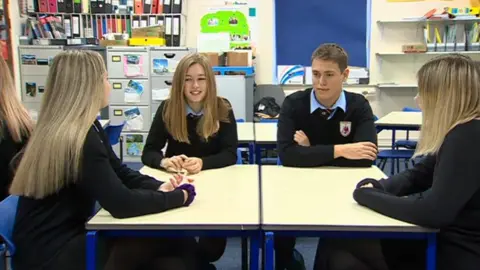Pisa education tests: Wales improves performance
 BBC
BBCWales has seen its performance improve in international tests in reading, maths and science but scores remain lower than in other parts of the UK.
Pisa tests are taken every three years by a sample of 15-years-olds in 79 countries and regions.
Education Minister Kirsty Williams said it was positive as a whole "but not perfect - we can go further still".
The Programme for International Student Assessment (or Pisa) is set by the Organisation for Economic Cooperation and Development (OECD) and allows us to compare the basic skills of teenagers in places right across the world.
Altogether, 3,165 pupils from 107 schools across Wales took the tests, which are set every three years.
In mathematics, the Wales average score (487) is close to the international average - and the highest score in the five tests so far.
It almost matched Scotland's average, after being 30 points behind it in 2012.
The Welsh score was the same as Italy and just behind Russia, but ranks higher than the United States, Luxembourg, Lithuania and Hungary.
The number of high-performing students in Wales rose from 4% to 7%.
There was also no significant gender gap for the first time.
In reading, Wales scored 483 - ranking just behind Austria and Switzerland but ahead of nations including Latvia, Italy, Croatia and Lithuania.
It is also the highest average score since Wales started doing the tests in 2006 - although still behind the other UK nations, with Scotland showing the biggest improvement.
The number of high-performing students in reading rose from 3% in 2015 to 7% in 2018.
Girls also out-performed boys.
However, 44% of pupils in Wales rarely or never read books compared with 35% on average in the OECD.
A survey of pupils taking the test found attitudes towards reading had in general become more negative in the last decade, with the change in Wales greater than across other nations and regions on average.
In science, Wales (488) is now very close to the international average and although an improvement on 2015, it is still below the 505 scored in 2006.
It scores above countries like Latvia and Spain and just behind the likes of Austria, Catalonia and Portugal.
There was a smaller increase in the proportion of high-performing Welsh students in science from 4% to 5%.
Across the world, 600,000 students - representing 32 million 15-year-olds - took the two-hour tests last year.
The Chinese provinces of Beijing, Shanghai, Jiangsu and Zhejiang - with a combined population of 180m - outperformed all other nations and regions, scoring 555 in reading, 591 in maths and 590 in science.
What's the picture within the UK?
Within the UK's four devolved education systems, England was the highest achiever in all three subjects.
Wales remained the lowest performing within the UK for all subjects, with Scotland better than Northern Ireland at reading and Northern Ireland outperforming Scotland at maths and science.
In reading tests, Wales scored below the average for OECD countries, while England, Scotland and Northern Ireland were all above average.
Meanwhile, head teachers in Wales reported to the researchers greater shortages or inadequacies of equipment and books than their UK counterparts.
Andreas Schleicher, head of education and skills at the OECD, said past results in Wales reflected a system where too many young people were leaving education without the basic skills they needed.
But he said poor Pisa results had been a "very healthy wake-up call" which had led to important reforms.
The quality of teaching has been identified as an area which needs to improve, and there have been recent changes to teacher training.
Mr Schleicher said the new curriculum being introduced from 2022 had some "very inspiring ideas" but how it is implemented will be the key.
What were they like to take?

Ellie, from Porthcawl Comprehensive School, Bridgend county said: "I found it a lot easier on the computer than writing in an exam - you could go back and re-do the answer if you thought it was wrong. It wasn't too much of a big deal."
Fellow pupil Jack said: "It was pretty easy - we were only told the day before we'd be doing them. It was just two hours doing multiple-choice questions."
Krista added: "It didn't seem much of a big deal - it was quite a chilled atmosphere in there. I don't really remember them - so it must mean it wasn't that scarring in terms of how awful it was. They weren't the same level as doing GCSE, it was just testing skills and how we coped with them."

But are pupils happy?
When the OECD asked pupils about their own feelings about their experiences in life, it found 54% of pupils in Wales "sometimes" or "always" felt miserable. This compared to the international average of 39%, while 63% of pupils "sometimes" or "always" felt worried (compared to a 50% OECD average).
Carole Willis, chief executive of the National Foundation for Educational Research, which carried out the study for the OECD, said: "While most pupils are generally happy, the results from Pisa highlight the importance of a focus on wellbeing in schools."
What is the response?
Education Minister Ms Williams said Wales was "for the first time ever..in the international mainstream, thanks to the efforts of our teachers and students".
"We have caught up, we are continuing to improve in all areas and as a nation we must be determined to keep up this momentum."
She called the increase in high-performers a "big step forward" and a "culture change" for Wales.
"But there's still more to do, as we're not quite at the OECD average for this aspect yet," she said.
"Not only have our overall scores gone up, we've also reduced the attainment gap. We can be proud that in Wales we truly partner equity with excellence."
Ms Williams added that Wales was heading in the right direction with reforms.
Dr Eithne Hughes, director of teaching union, the Association of School and College Leaders Cymru, called the results a "real boost".
"Of course, we want to do a good deal better than this in the future and our national ambition is to make our education system among the very best in the world," she said.
"We would always caution people against over-claiming or over-blaming any one factor on the difference in results between countries. Pisa is just one measure of an education system and cannot possibly tell the full story about our schools."
The National Education Union in Wales said Pisa rankings were not the "be all and end all" of a country's educational performance and "striving to secure pupil happiness and well-being should be the emphasis for the Welsh Government going forward".
The head teachers' union NAHT Cymru said it was vital schools and new reforms were "funded properly and fairly" so improvements could continue.
